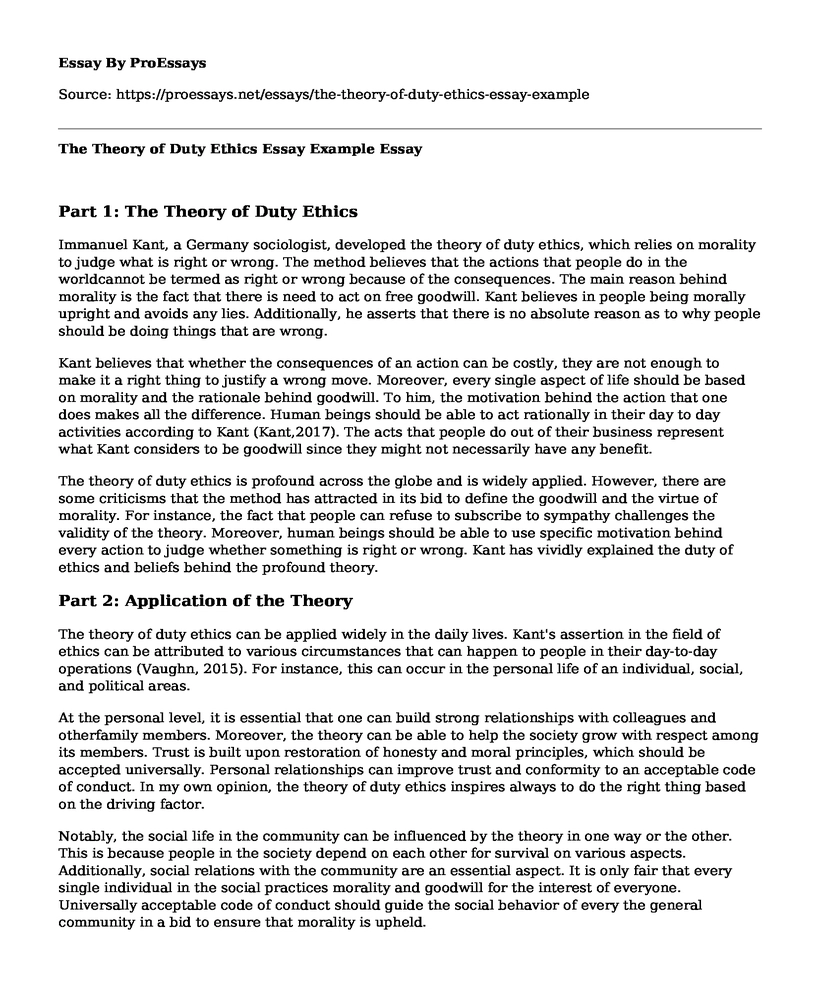Part 1: The Theory of Duty Ethics
Immanuel Kant, a Germany sociologist, developed the theory of duty ethics, which relies on morality to judge what is right or wrong. The method believes that the actions that people do in the worldcannot be termed as right or wrong because of the consequences. The main reason behind morality is the fact that there is need to act on free goodwill. Kant believes in people being morally upright and avoids any lies. Additionally, he asserts that there is no absolute reason as to why people should be doing things that are wrong.
Kant believes that whether the consequences of an action can be costly, they are not enough to make it a right thing to justify a wrong move. Moreover, every single aspect of life should be based on morality and the rationale behind goodwill. To him, the motivation behind the action that one does makes all the difference. Human beings should be able to act rationally in their day to day activities according to Kant (Kant,2017). The acts that people do out of their business represent what Kant considers to be goodwill since they might not necessarily have any benefit.
The theory of duty ethics is profound across the globe and is widely applied. However, there are some criticisms that the method has attracted in its bid to define the goodwill and the virtue of morality. For instance, the fact that people can refuse to subscribe to sympathy challenges the validity of the theory. Moreover, human beings should be able to use specific motivation behind every action to judge whether something is right or wrong. Kant has vividly explained the duty of ethics and beliefs behind the profound theory.
Part 2: Application of the Theory
The theory of duty ethics can be applied widely in the daily lives. Kant's assertion in the field of ethics can be attributed to various circumstances that can happen to people in their day-to-day operations (Vaughn, 2015). For instance, this can occur in the personal life of an individual, social, and political areas.
At the personal level, it is essential that one can build strong relationships with colleagues and otherfamily members. Moreover, the theory can be able to help the society grow with respect among its members. Trust is built upon restoration of honesty and moral principles, which should be accepted universally. Personal relationships can improve trust and conformity to an acceptable code of conduct. In my own opinion, the theory of duty ethics inspires always to do the right thing based on the driving factor.
Notably, the social life in the community can be influenced by the theory in one way or the other. This is because people in the society depend on each other for survival on various aspects. Additionally, social relations with the community are an essential aspect. It is only fair that every single individual in the social practices morality and goodwill for the interest of everyone. Universally acceptable code of conduct should guide the social behavior of every the general community in a bid to ensure that morality is upheld.
Politically, Kant's theory is efficient in the sense that, it influences what the law regards as illegal or illegal. Moral principles are widely applicable in the process of policy formulation. The general public also has an obligation and to ensure that morals are upheld by upcoming generations. Legislative authorities of each country can apply the theory while coming up with rational laws for their respective offices. The approach is educative as it is widely applicable.
References
Kant, I. (2017). Kant: The metaphysics of morals. Cambridge University Press.
Vaughn, L. (2015). Doing ethics: Moral reasoning and contemporary issues. WW Norton & Company.
Cite this page
The Theory of Duty Ethics Essay Example. (2022, Jun 06). Retrieved from https://proessays.net/essays/the-theory-of-duty-ethics-essay-example
If you are the original author of this essay and no longer wish to have it published on the ProEssays website, please click below to request its removal:
- Term Paper Sample on Criminal Ethics
- Aristotelian Virtue Theory Essay
- Global Journalism Ethics Paper Example
- Effect of Food, Agriculture, Soil, and Plastics on the Digestive System - Essay Sample
- Essay on Exploring Piety & Impiety: Socrates & Euthyphro's Debate
- Researchers' Hidden Agenda: Ethics Violation in Experiment - Essay Sample
- Agency Promoting Ethics: Role & Duty of Administrators - Essay Sample







